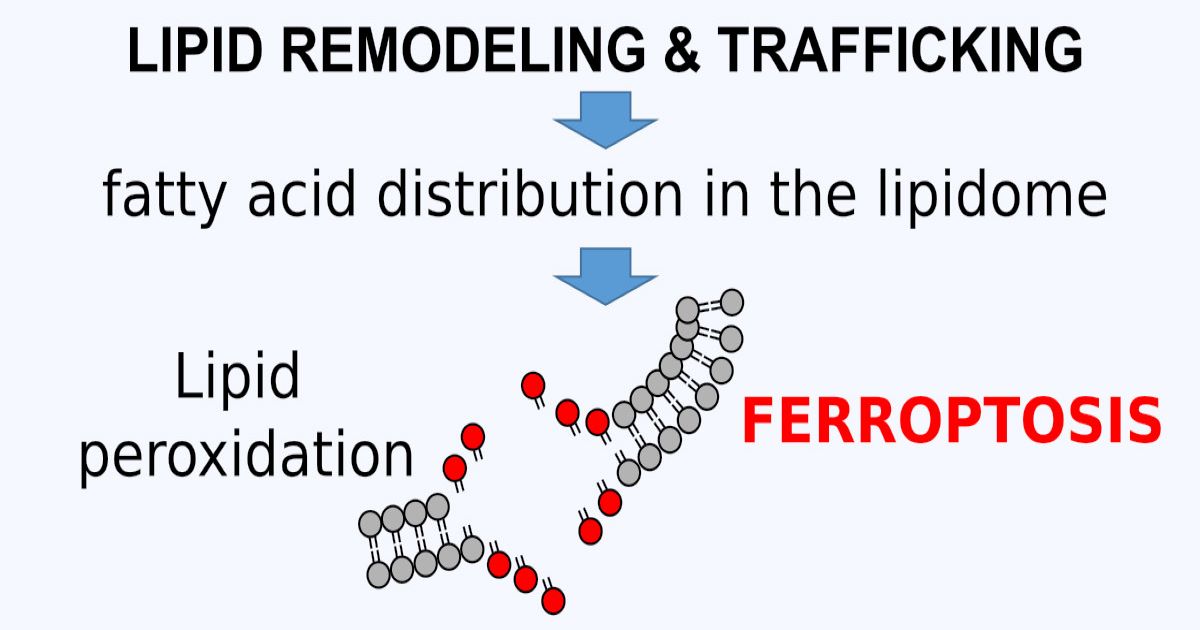Lipid Remodeling, Trafficking, and Ferroptosis: A Programmed Fatty Death
A special issue of Biomolecules (ISSN 2218-273X). This special issue belongs to the section "Biological Factors".
Deadline for manuscript submissions: closed (31 October 2023) | Viewed by 525

Special Issue Editors
Interests: lipid metabolism; lipogenesis; lipidomics; hepatocellular carcinoma; anthracyclines; ferroptosis
Special Issues, Collections and Topics in MDPI journals
Interests: inflammation; innate immunity; lipid mediators; phospholipases; lipins
Special Issues, Collections and Topics in MDPI journals
Special Issue Information
Dear Colleagues,
The modulation of ferroptosis is emerging as a promising tool to induce this programmed cell death and treat different pathophysiological conditions, such as cancer and inflammatory diseases. In ferroptosis, the peroxidation of polyunsaturated fatty acids (PUFAs) wreaks havoc on the cell membranes. Beyond the global content of PUFAs in the cell, the remodeling and trafficking of PUFAs are regulated by specific enzymes (e.g., phospholipases and acyltransferases). Consequently, the regulation and metabolism of PUFAs are key players in the sensitization to ferroptosis. In contrast to PUFAs, other lipids may quench ferroptosis. Hence, in a holistic view, the regulation of the lipidome may modulate the sensitivity of cells to ferroptosis. In conclusion, the characterization of the lipidome is preferred for a better understanding of ferroptosis.
Considering this context, in this Special Issue we welcome original and review manuscripts with new perspectives on the role of the lipidome in ferroptosis. Studies about the role of phospholipases, acyltransferases, and lipoxygenases on ferroptosis are particularly welcome.
We look forward to receiving your contributions.
Dr. David Balgoma
Prof. Dr. Jesús Balsinde
Guest Editors
Manuscript Submission Information
Manuscripts should be submitted online at www.mdpi.com by registering and logging in to this website. Once you are registered, click here to go to the submission form. Manuscripts can be submitted until the deadline. All submissions that pass pre-check are peer-reviewed. Accepted papers will be published continuously in the journal (as soon as accepted) and will be listed together on the special issue website. Research articles, review articles as well as short communications are invited. For planned papers, a title and short abstract (about 100 words) can be sent to the Editorial Office for announcement on this website.
Submitted manuscripts should not have been published previously, nor be under consideration for publication elsewhere (except conference proceedings papers). All manuscripts are thoroughly refereed through a single-blind peer-review process. A guide for authors and other relevant information for submission of manuscripts is available on the Instructions for Authors page. Biomolecules is an international peer-reviewed open access monthly journal published by MDPI.
Please visit the Instructions for Authors page before submitting a manuscript. The Article Processing Charge (APC) for publication in this open access journal is 2700 CHF (Swiss Francs). Submitted papers should be well formatted and use good English. Authors may use MDPI's English editing service prior to publication or during author revisions.
Keywords
- ferroptosis
- lipidome
- lipidomics
- phospholipases
- acyltransferases
- lipoxygenases
- lipid peroxidation
Benefits of Publishing in a Special Issue
- Ease of navigation: Grouping papers by topic helps scholars navigate broad scope journals more efficiently.
- Greater discoverability: Special Issues support the reach and impact of scientific research. Articles in Special Issues are more discoverable and cited more frequently.
- Expansion of research network: Special Issues facilitate connections among authors, fostering scientific collaborations.
- External promotion: Articles in Special Issues are often promoted through the journal's social media, increasing their visibility.
- e-Book format: Special Issues with more than 10 articles can be published as dedicated e-books, ensuring wide and rapid dissemination.
Further information on MDPI's Special Issue polices can be found here.
Related Special Issue
- Phospholipases: From Structure to Biological Function in Biomolecules (17 articles)







